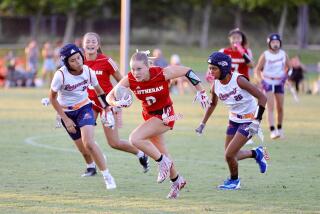Housing Plan May Go Before Irvine Voters : Development: A slow-growth group has qualified a ballot referendum to block the Irvine Co. project, already approved by the City Council.
IRVINE — Slow-growth activists succeeded Friday in qualifying a ballot referendum aimed at blocking the controversial, 3,800-home Westpark II subdivision, city officials said.
Westpark II is the first new housing tract approved by the Irvine City Council since 1985. It would be the first housing project to go before the city’s voters, officials said. However, in November, 1975, voters approved a measure aimed at reducing the planned density of Northwood, one of Irvine’s oldest residential areas.
Irvine Tomorrow, a grass-roots political group, submitted petitions bearing the verified signatures of more than 10% of the city’s registered voters, forcing the City Council to either overturn its December approval of the Irvine Co.’s proposed subdivision or place the issue on the ballot, according to City Clerk Nancy C. Lacey.
“We’re really excited about it--we’re jazzed,” said Joi Hogan, one of the leaders of the petition drive that collected 8,652 signatures over the past few weeks. “This is a real big victory for us.”
Lacey said she will ask the council at its Feb. 12 meeting to decide what it wants to do.
If the voters or the council reject the project, Lacey said, the Irvine Co. can submit its plans again in a year.
Irvine Tomorrow submitted the petitions to Lacey’s office Jan. 9. Officials at the Orange County registrar of voters office then checked to see that the signatures were from registered voters who live in Irvine. When the verified count exceeded the 5,621 needed, Lacey said, she asked that the count be stopped.
The county charges cities 60 cents to verify each signature.
The slow-growth group, which claims about 200 members, fought the proposed subdivision during public hearings last year but the council approved it in December.
Members of Irvine Tomorrow complained that the new subdivision, to be located in an agricultural area east of the Tustin Marine Corps Air Station, would bring too much traffic to the city and deflate home prices for current residents. The group also argued that residents of the new subdivision would be exposed to potentially hazardous electromagnetic fields from nearby power transmission lines and to too much noise from the nearby Marine helicopter base.
Rather than accept the council’s approval of the project, the group began circulating petitions in mid-December.
Irvine Tomorrow was formed last summer after a conservative majority was elected to the City Council. Since then, members of the group have sparred with the council at every turn. Mayor Sally Anne Sheridan and other officials complain that the group refuses to accept the results of the June, 1990, election that threw out former Mayor Larry Agran and all but one of his council allies.
Proponents of Westpark II on Friday accused petition circulators of spreading false information about the project. Councilman Barry J. Hammond said the petition drive would have failed if voters knew the facts. He said several petition circulators approached him and claimed incorrectly that the Westpark II plan violates the city’s general growth plan and that the land is meant to be saved as open space.
Most people probably didn’t know, he said, that the council approved Westpark II with fewer homes than is called for in the city’s growth plan and that approval of the project would lead to the city obtaining more permanent open space under an agreement approved by voters last year.
The agreement calls for the Irvine Co. to turn over some of its land to the public in exchange for building rights on other properties.
Irvine Tomorrow’s Hogan said all petition circulators were given accurate information about the project.
“We made sure people had the right information,” she said. “We didn’t intentionally mislead anyone.”
The Irvine Co. declined to comment on the success of the petition drive or what actions the firm might take.
But when the petitions were first submitted to the city clerk, the company issued a statement that described Irvine Tomorrow activists as “leaders of a no-growth fringe group of political liberals who are using Westpark II as a vehicle for their attempt to regain political power in Irvine.”
The company also reiterated that the Westpark II project meets or exceeds all city standards and that the agricultural field where the homes are planned is listed in the city’s blueprint for growth as a residential village.
Although the signature drive’s success is Irvine Tomorrow’s first major political victory, the group already influences council actions.
Last September, for example, members of Irvine Tomorrow helped persuade the council to defeat Hammond’s proposal to begin council meetings with a moment of silence.
And when the City Council was considering a proposal to erect a Christmas tree at City Hall during the holidays, Irvine Tomorrow rallied opposition by mailing about 1,200 letters to Irvine residents and clergy asking them to protest the plan, which was defeated.
More to Read
Sign up for Essential California
The most important California stories and recommendations in your inbox every morning.
You may occasionally receive promotional content from the Los Angeles Times.










